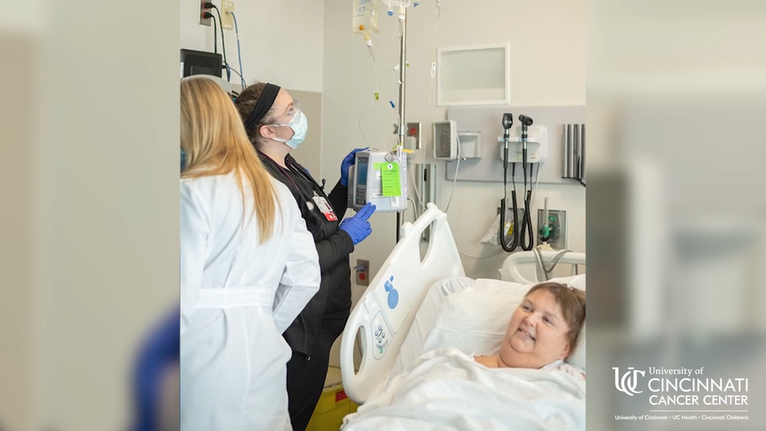Lymphoma: A Closer Look
Lymphoma is a type of blood cancer that affects about 200,000 Americans each year. Lymphoma occurs in the lymphatic system, which is the network your body uses to fight disease. It includes the spleen, lymph nodes, thymus gland and bone marrow.
The main types of lymphoma are Hodgkin’s lymphoma and non-Hodgkin’s lymphoma.
Typical treatment can include medication, chemotherapy, radiation therapy, stem cell transplant and cellular therapy
A New Therapy and A Very Dedicated Care Team
In full-blown kidney failure caused by lymphoma, Jina underwent multiple rounds of dialysis.
“That was tough on me,” she says.
“Lymphoma had pretty much taken over the whole of her body: her skin, blood, lymph nodes‑everywhere,” said Tahir Latif, MD, Medical Director Outpatient Infusion Services; Interim Director, Hematology Oncology; Associate Professor of Medicine, and Jina’s oncologist.
To combat her lymphoma, she underwent two cycles of chemotherapy‑but her cancer journey didn’t end there. Twenty percent of patients diagnosed with lymphoma don’t respond to conventional therapies, such as chemotherapy or radiation. In Jina’s case, the lymphoma came back after both chemotherapy and stem cell treatment.
“Dr. Latif thought I would be a good patient for a new treatment called CAR T-cell therapy,” Jina explained. “It was the first time they performed it at UC. I know he wouldn’t have recommended it if he didn’t think I was a good candidate.”
What is CAR T-Cell therapy?
T-cells are a type of white blood cell that help make up your immune system. Chimeric antigen receptor, or CAR T-cell therapy, is a promising new therapy that gets T-cells to fight cancer. It works by changing a patient’s T-cells in a lab so that they can find and destroy cancer cells, like tiny, well-trained soldiers.
CAR T-cell therapy is often administered with just a single infusion. Patients need to stay in the hospital to be monitored for side effects but are often able to go home within two weeks.
CAR T-cell therapy is proving to be a powerful tool in the fight against blood cancer. Clinical trials have shown that CAR T-cell therapy helps patients achieve remission even after they’ve had multiple cancer treatments. Some patients can live longer without their cancer getting worse, and sometimes, these patients can then be cured.
CAR T-cell therapy is FDA-approved for certain lymphomas and for some patients with acute lymphoblastic leukemia that doesn’t respond to other treatments. Many clinical trials are underway with the hope of using this strategy to treat other cancers.
CAR T-cell therapy may be an option when first or second-line treatment options have failed, or if cancer has returned after previously being treated.
“We take the T-cells and turn them from being ordinary soldiers into commanders. Then we give them back to you so they can fight even more for you,” said Dr. Latif.
For many patients, especially those facing long and complex health concerns like blood disorders or cancer, the physicians, nurses and other members of the care team offer knowledge, compassion, support and guidance. It was support Jina needed as she recovered.
There are known risks associated with CAR T-cell therapy, including neurological factors. Jina fell into a coma and required intensive care for several days following her CAR T-cell therapy infusion. When she woke up, she needed weeks of rehabilitation.
“My care team rocks. They did a great job. They were very supportive, and I appreciate everything they did. My family and friends kept pushing, offering prayers and positive thoughts,” Jina says. “You have to have faith in your nurses and your doctors. And the big guy upstairs,” she concludes, motioning up.
A Small Town Rallies Around One of Its Own
Jina’s hometown of Milan, Indiana is just an hour from UC Cancer Center, but a world away from Cincinnati. With only 2,000 residents, it’s a town where most everyone knows everybody.
“Milan is a small community. Everybody pulls together. They were so supportive,” Jina said.
Her cancer treatments and CAR T-cell therapy coincided with her daughter’s senior year of high school, a bittersweet and tender year for many families.
“It was my daughter’s senior year of volleyball, and they organized donations for me. And then an anonymous donor matched all the income for that,” she said. “It was a huge help.”



